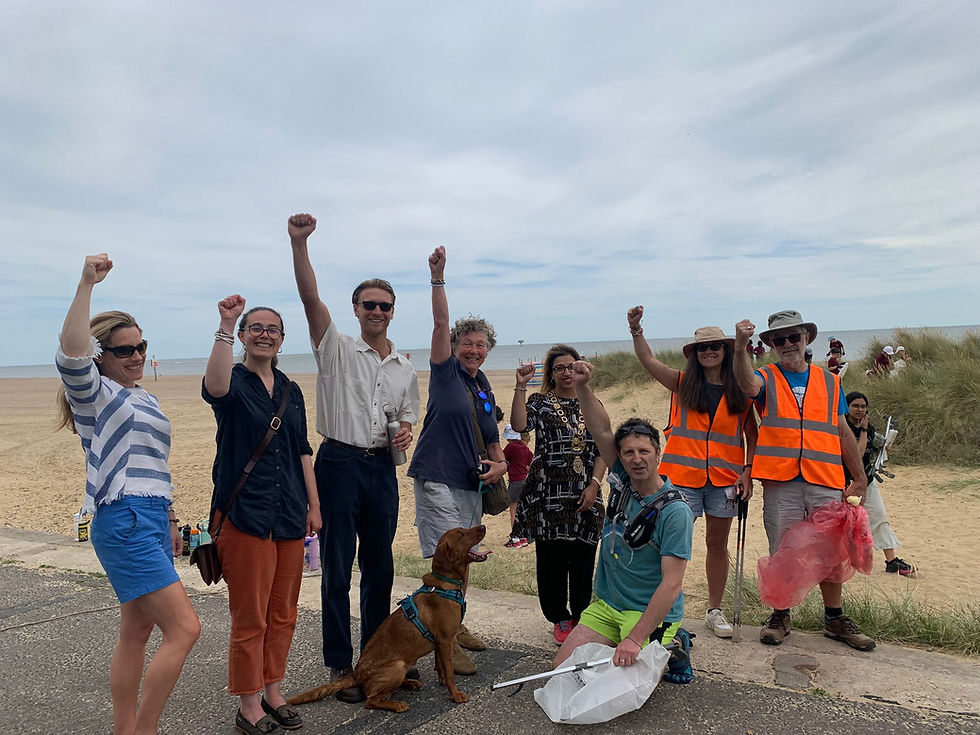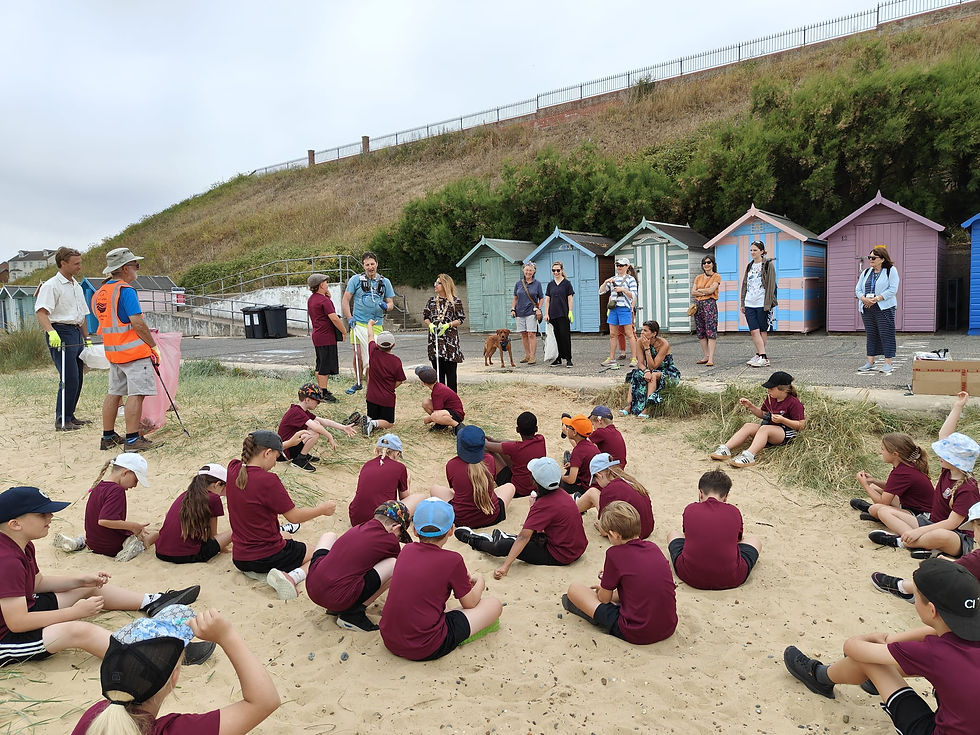Setting the Standard: Essex Chapter — From Coastline Runs to Classroom Lessons
- Nathalia Fisher
- Oct 23, 2025
- 3 min read
When Luke Douglas-Home — better known as The Coastline Runner — heads for the shore, he’s not chasing miles. He’s tracing stories: of plastic pollution, changing tides, and the communities determined to do better. Each stretch of coastline becomes a lesson — about what we throw away, what washes back, and what it takes to turn awareness into action.
This September, Setting the Standard — an initiative by A Future Without Rubbish (AFWR) and supported by the Nineveh Trust and Tudwick Foundation — moved from Suffolk to Essex, continuing its mission to turn clean-ups into systemic change.
What is Setting the Standard?
Setting the Standard is a growing initiative that brings schools, councils, businesses, and communities (S-C-B-C) together to make local environmental action truly effective.

The idea is simple:
When a beach clean ends, the effort shouldn’t. Each chapter of the project gathers evidence — from the type of waste collected to how local councils respond — creating reports that can influence better policies, binfrastructure, and accountability.
After a successful pilot in Suffolk earlier this year, the lessons learned there are now being applied along the Essex coastline.
Essex Chapter begins: A festival of ideas and action

The Essex Chapter officially launched on 23 September at the Let’s Talk Trash Festival at Braxted Park.
Luke opened the event in his signature style — by running from Heybridge Basin to Braxted Park, collecting litter along the way. Nearly 500 students took part in the festival, joined by Clean Up Britain’s Ed Lennox, who co-led three lively sessions exploring how everyday waste connects to global pollution.
Among the attendees were the Lord Lieutenant of Essex, the High Sheriff of Essex, local councillors, and local businesses. Students signed a petition calling for a ban on helium balloons near the coast — a small but powerful step toward systemic change.
Frinton-on-Sea: Hands in the sand, lessons in action
A week later, on 2 October, the Essex Chapter continued with a beach clean and learning session in Frinton-on-Sea, joined by pupils from St. Philomena’s School and Mayflower Primary School in Harwich.
Luke began with an interactive talk on what he finds during his coastline runs — plastic bottles, helium balloons, snack wrappers, even a roll of cling film — and how each of these affects our environment.

The morning turned competitive with two activities:
A treasure hunt to identify an item Luke had found earlier in Suffolk.
A “Who collects the most waste” challenge, where both schools tied for first place, thanks to their remarkable enthusiasm.
Prizes were provided by Waterhaul, whose litter pickers and vouchers rewarded the young environmentalists’ efforts. The collaboration didn’t stop there: both schools were invited to keep up their local action by reporting ghost gear they find in future — earning more Waterhaul prizes for doing so.
Even though Frinton beach was relatively clean (thanks to a recent large-scale clean-up), students still uncovered small plastics and fragments — the kind that quietly linger despite regular efforts.
Cllr Adrian Smith from Tendring District Council joined the event, supporting with equipment and waste collection — a practical example of S-C-B-C in action: schools, council, business, community.
Running the coast: data, learning, and persistence
Between events, Luke continued his signature plog runs along the Essex coast — from Heybridge Basin to Braxted Park, Harwich to Walton-on-the-Naze, and Frinton-on-Sea to Clacton-on-Sea.
Each route revealed a slightly different story:
Inland litter that never makes it to the bin,
Beaches that look clean but hide microplastics,
And stretches where the tide itself halts progress — a reminder of how powerful, and fragile, our coastlines are.
These runs aren’t just symbolic. They feed into the Setting the Standard reporting system — mapping what’s found, where it’s coming from, and what local systems (or gaps) contribute to it.
Why it matters: S-C-B-C in practice

Every action under Setting the Standard is guided by S-C-B-C: Schools, Councils, Businesses, and Communities working together.
Schools teach the next generation to act and record what they find.
Councils ensure proper binfrastructure and waste management.
Businesses support with resources and responsibility.
Communities keep the effort alive long after the clean-up ends.
This model makes each beach clean measurable, replicable, and environmentally sustainable.
What’s next
The Essex Chapter is ongoing, with more coastline runs and collaborative data gathering ahead. The findings from Suffolk are being compiled into a Setting the Standard Report, while Essex’s insights will soon follow — showing how evidence and collaboration can push for real change.
Because when we truly set the standard, we stop measuring success in bags of rubbish — and start measuring it in what stays clean.



Comments